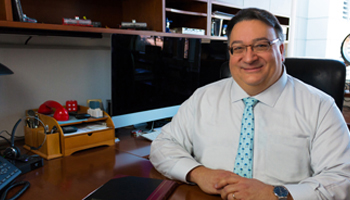HOW CAN WE HELP YOU? Call 1-800-TRY-CHOP
In This Section
CSO Perspectives: Tuning in to Violence Prevention Initiative and Youth's Voice in Research
 The Violence Prevention Initiative (VPI) at Children’s Hospital of Philadelphia is a standout example of how our research is taking hold in communities, and now the entire country knows more about it after a live broadcast by “Good Morning America” at our Karabots Pediatric Care Center featuring an interview with Madeline Bell, president and chief executive officer of CHOP.
The Violence Prevention Initiative (VPI) at Children’s Hospital of Philadelphia is a standout example of how our research is taking hold in communities, and now the entire country knows more about it after a live broadcast by “Good Morning America” at our Karabots Pediatric Care Center featuring an interview with Madeline Bell, president and chief executive officer of CHOP.
VPI is a CHOP-wide effort to protect youth from violence. Behind all the excitement about GMA’s recognition of VPI as one of CHOP’s most impactful community-involved programs, is evidence-based research that has contributed to a variety of programs focused on education and interventions in school, clinical, and community settings.
The VPI program highlighted by GMA, Free2B, is an interactive, 3D bullying prevention program that combines CHOP’s best-practice science with the latest technology from partner Life Changing Experiences to engage and empower students to help create safer school climates. Free2B has been shown both nationally and internationally, reaching thousands of youth in more than 75 schools to date.
In the Research Institute’s Annual Report 2016, we showcased VPI’s Friend to Friend (F2F) program, a small-group school-based intervention that uses videos, cartoons, role-plays and other innovative teaching methods to address relational aggression — colloquially known as “mean girl” behaviors that are often a component of bullying — among third to fifth-grade girls in urban schools. F2F has been in development and testing for more than 15 years by Stephen S. Leff, PhD, co-director of VPI and professor of Clinical Psychology in Pediatrics and Psychiatry in the Perelman School of Medicine at the University of Pennsylvania, in collaboration with CHOP experts, students, parents, teachers, and other school stakeholders.
VPI researchers also recognize that each year, CHOP’s emergency department clinicians see more youth who have been violently injured. Assault-injured youth are at the highest risk for future violence and poor outcomes. A new study of youth enrolled in VPI’s Violence Intervention Program demonstrates that attending to their external wounds is not enough. The majority of adolescent males receiving care in the pediatric ED after experiencing a violence-related injury — typically from peer assaults — felt they needed mental health services.
“The results of this research strongly indicate that when asked, violently injured young men will be open about their recovery needs,” stated lead author Sage Myers, MD, MSCE, who is a research scientist with VPI. “We just need to be able to ask and listen to them.”
VPI gives youth and families a much needed voice to stop violence and support healing, and our researchers will continue to ensure it’s heard loud and clear. Stay tuned, and get more information about resources provided by VPI.